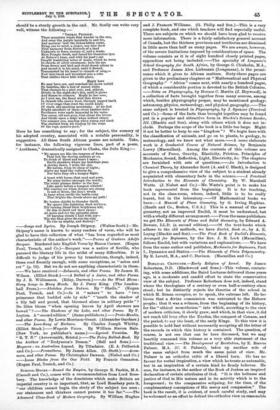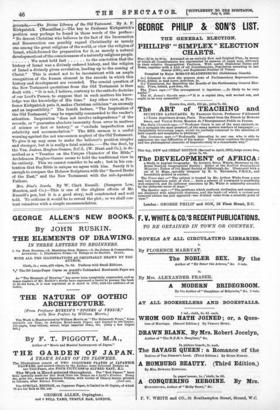BIBLICAL CBITICISH.—Early Religion of Israel. By James Robertson, D.D. (Blackwood
and Sons.)—This volume, contain- ing, with some additions, the Baird Lectures delivered three years ago, is a moderate and candid effort to state the conservative view of the subject. Professor Robertson does not, indeed, stand where the theologians of a century or even half-a-century since stood ; but he distinctly rejects the theories of the school in which M. Renan occupies, so to speak, the extreme left. He be- lieves that a divine commission was entrusted to the Hebrew people ; that it was a witness, from the beginning of its history, for the "ethical monotheism" into which, according to the view of modern criticism, it slowly grew, and whieh, in that view, it did not reach till long after the Exodus, the conquest of Canaan, and the period, to say the least, of the early Kings. To this view it is possible to hold fast without necessarily accepting all the letter of the records in which this history is contained. The question, of course, is not one that can be here discussed, but we may heartily commend this volume as a very able statement of the traditional view.—The Development of Revelation, by E. Reeves Palmer, M.A. (C. S. Palmer), takes up another side of the same subject from much the same point of view. Mr. Palmer is an orthodox critic of a liberal turn. He has no favour for verbal inspiration, a view which he treats as untenable, but in an inspiration of a certain kind he firmly believes. He sees, for instance, in the author of the Book of Joshua an inspired declaration of certain attributes of God. "It is the holiness and justice of God in His nature and in its activity which is to the foreground ; to the comparative eclipsing, for the time, of the complementary conceptions of His mercy and compassion." The book is the result, it is evident of much careful study, and may be welcomed RS an effort to defend the orthodox view on reasonable grounds.—The Divine Library of the Old Testament. By A. F. Kirkpatrick. (Macmillan.)—The key to Professor Kirkpatrick's position may perhaps be found in these words of the preface : "No devout Christian who believes in the fact of the Incarnation and Resurrection can possibly regard Christianity as merely one among the great religions of the world, or view the religion of Israel, which formed the preparation for it, as merely a natural development out of the consciousness of a naturally religious people. We must hold fast to the conviction that the history of Israel was a divinely ordered history, and the religion of Israel a divinely given revelation, leading up to the coming of Christ." This is stated not to be inconsistent with an ample recognition of the human element in the records in which this history and development are recorded. The crucial question of the New Testament quotations from the Old Testament is then dealt with : "It is not, I believe, contrary to the catholic doctrine of our Lord's Person, to suppose that in such matters his know- ledge was the knowledge of His time." Any other view, as Pro- fessor Kirkpatrick puts it, makes Christian criticism "an anomaly and an impossibility." The fourth lecture, "The Inspiration of the Old Testament," may be especially commended to the reader's attention. Inspiration "does not involve independence" of the records, or "guarantee absolute immunity from error in matters of science or fact or history," or "exclude imperfection and relativity and accommodation." The fifth sermon is a useful warning against the not uncommon neglect of the Old Testament. To give it up may seem to make the believer's position simpler and stronger, but it is really a fatal mistake.—The One Book, by the Ven. Joshua Hughes-Games, D.C.L. (W. Hunt and Co.), is de- scribed as a "Treatise on the 'Unique Character of the Bible." Archdeacon Hughes-Games seems to hold the traditional view in its entirety. This we cannot consider to be safe ; but in his con- tention that the Bible is unique we agree with him Surely it is enough to compare the Hebrew Scriptures with the" Sacred Books of the East," and the New Testament with the sub-Apostolic Fathers.



















































 Previous page
Previous page